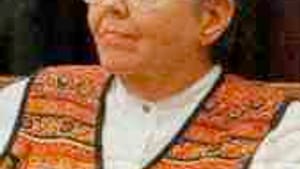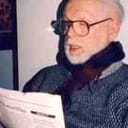Stay in the Loop
BSR publishes on a weekly schedule, with an email newsletter every Wednesday and Thursday morning. There’s no paywall, and subscribing is always free.
They rattled our ivory towers
Howard Zinn and Mary Daly: Up the academy

I'm not sure Howard Zinn and Mary Daly even knew each other, but they shared their departure month— January, 2010— and both lived in Boston. They also shared a penchant for challenging smug academic certainties and complacent administrators.
He, the son of Jewish immigrants in the poorest section of Brooklyn. She the only daughter of a working-class Irish couple in Schenectady. He got turned on by Charles Dickens at 17. Young Communist neighbors encouraged him to join them at a political rally on Times Square. The police knocked him unconscious and he became "ferociously indignant."
Returning as a bombardier from Europe, Zinn had second thoughts about war, stashing his medals and ribbons. He worked blue-collar as he earned degrees from New York University and Columbia.
My guiding light, my oldest son Michael, turned me on to Zinn's first classic, A People's History of the United States, which Zinn privately printed in an edition of 5,000 in 1980. The book charged Christopher Columbus and other explorers with genocide and picked apart presidents from Andrew Jackson to Franklin D. Roosevelt while celebrating workers, feminists and war resisters. Zinn's left-wing version of American history became an underground sensation, selling more than a million copies by 2003.
Marching with the students
In 1956 the black women's Spelman College in Atlanta made him its history chair. He stood behind the students when they integrated the Georgia Assembly as well as their public libraries— until the brass took away his tenure for being a perennial pest. He "graduated" to Boston University, where he tried the patience of its perpetually hypersensitive president, John Silber.
Zinn had a quick eye to the end. When liberals began to grumble about last year's big bank bailout, he recalled that the Constitutional convention of 1787 had as its immediate agenda to redeem the speculators' bonds at full value! "Democracy," Zinn reminded his readers, "grows from the bottom up, not vice versa."
His chum Noam Chomsky, not known for hyperlatives, adjudged that Zinn "changed the conscience of America in a highly constructive way."
Catholic misogyny
So did Mary Daly, at the nearby Jesuit Boston College. She was the world's first feminist philosopher, at least since the 11th-Century German nun Hildegard von Bingen. Daly was the first to receive a Ph. D. in religious studies at Notre Dame (in 1953), after which she earned Ph. D.'s in philosophy and theology— in Switzerland, because women couldn't enter such programs in the U.S. at the time.
Daly's notoriety began in 1968, when she riled the brass at Boston College with her book, The Church and the Second Sex, which exposed misogyny in the Roman Catholic Church. She was being denied tenure, until 1,500 male students took up her cause for four months. And she won!
In 1978 she came out with Gyn/Ecology: The Metaethics of Radical Feminism, in which Daly explored such then-hidden topics as cultural and sexual violence against women, female genital mutilation, and foot binding.
Daly created another firestorm in 1998 when she excluded males from a new Boston College course in feminist ethics. She liked to lecture in hiking clothes and mocked her academic assailants as bore-ocrats afflicted with academentia. The Jesuits gladly accepted her retirement in 2001.
Zinn was 87 when he died, Daly 81. Let us pray that young Zinns and Dalys will step forward in their places to inject more backbone into those gutless time-servers who too often dominate faculties. R.I.P.— that is, Rejoice in Provocations.♦
To read a response, click here.
He, the son of Jewish immigrants in the poorest section of Brooklyn. She the only daughter of a working-class Irish couple in Schenectady. He got turned on by Charles Dickens at 17. Young Communist neighbors encouraged him to join them at a political rally on Times Square. The police knocked him unconscious and he became "ferociously indignant."
Returning as a bombardier from Europe, Zinn had second thoughts about war, stashing his medals and ribbons. He worked blue-collar as he earned degrees from New York University and Columbia.
My guiding light, my oldest son Michael, turned me on to Zinn's first classic, A People's History of the United States, which Zinn privately printed in an edition of 5,000 in 1980. The book charged Christopher Columbus and other explorers with genocide and picked apart presidents from Andrew Jackson to Franklin D. Roosevelt while celebrating workers, feminists and war resisters. Zinn's left-wing version of American history became an underground sensation, selling more than a million copies by 2003.
Marching with the students
In 1956 the black women's Spelman College in Atlanta made him its history chair. He stood behind the students when they integrated the Georgia Assembly as well as their public libraries— until the brass took away his tenure for being a perennial pest. He "graduated" to Boston University, where he tried the patience of its perpetually hypersensitive president, John Silber.
Zinn had a quick eye to the end. When liberals began to grumble about last year's big bank bailout, he recalled that the Constitutional convention of 1787 had as its immediate agenda to redeem the speculators' bonds at full value! "Democracy," Zinn reminded his readers, "grows from the bottom up, not vice versa."
His chum Noam Chomsky, not known for hyperlatives, adjudged that Zinn "changed the conscience of America in a highly constructive way."
Catholic misogyny
So did Mary Daly, at the nearby Jesuit Boston College. She was the world's first feminist philosopher, at least since the 11th-Century German nun Hildegard von Bingen. Daly was the first to receive a Ph. D. in religious studies at Notre Dame (in 1953), after which she earned Ph. D.'s in philosophy and theology— in Switzerland, because women couldn't enter such programs in the U.S. at the time.
Daly's notoriety began in 1968, when she riled the brass at Boston College with her book, The Church and the Second Sex, which exposed misogyny in the Roman Catholic Church. She was being denied tenure, until 1,500 male students took up her cause for four months. And she won!
In 1978 she came out with Gyn/Ecology: The Metaethics of Radical Feminism, in which Daly explored such then-hidden topics as cultural and sexual violence against women, female genital mutilation, and foot binding.
Daly created another firestorm in 1998 when she excluded males from a new Boston College course in feminist ethics. She liked to lecture in hiking clothes and mocked her academic assailants as bore-ocrats afflicted with academentia. The Jesuits gladly accepted her retirement in 2001.
Zinn was 87 when he died, Daly 81. Let us pray that young Zinns and Dalys will step forward in their places to inject more backbone into those gutless time-servers who too often dominate faculties. R.I.P.— that is, Rejoice in Provocations.♦
To read a response, click here.
Sign up for our newsletter
All of the week's new articles, all in one place. Sign up for the free weekly BSR newsletters, and don't miss a conversation.

 Patrick D. Hazard
Patrick D. Hazard